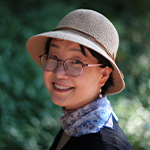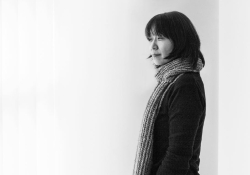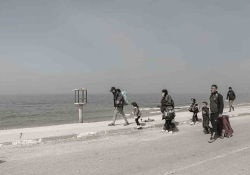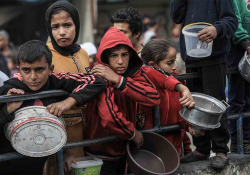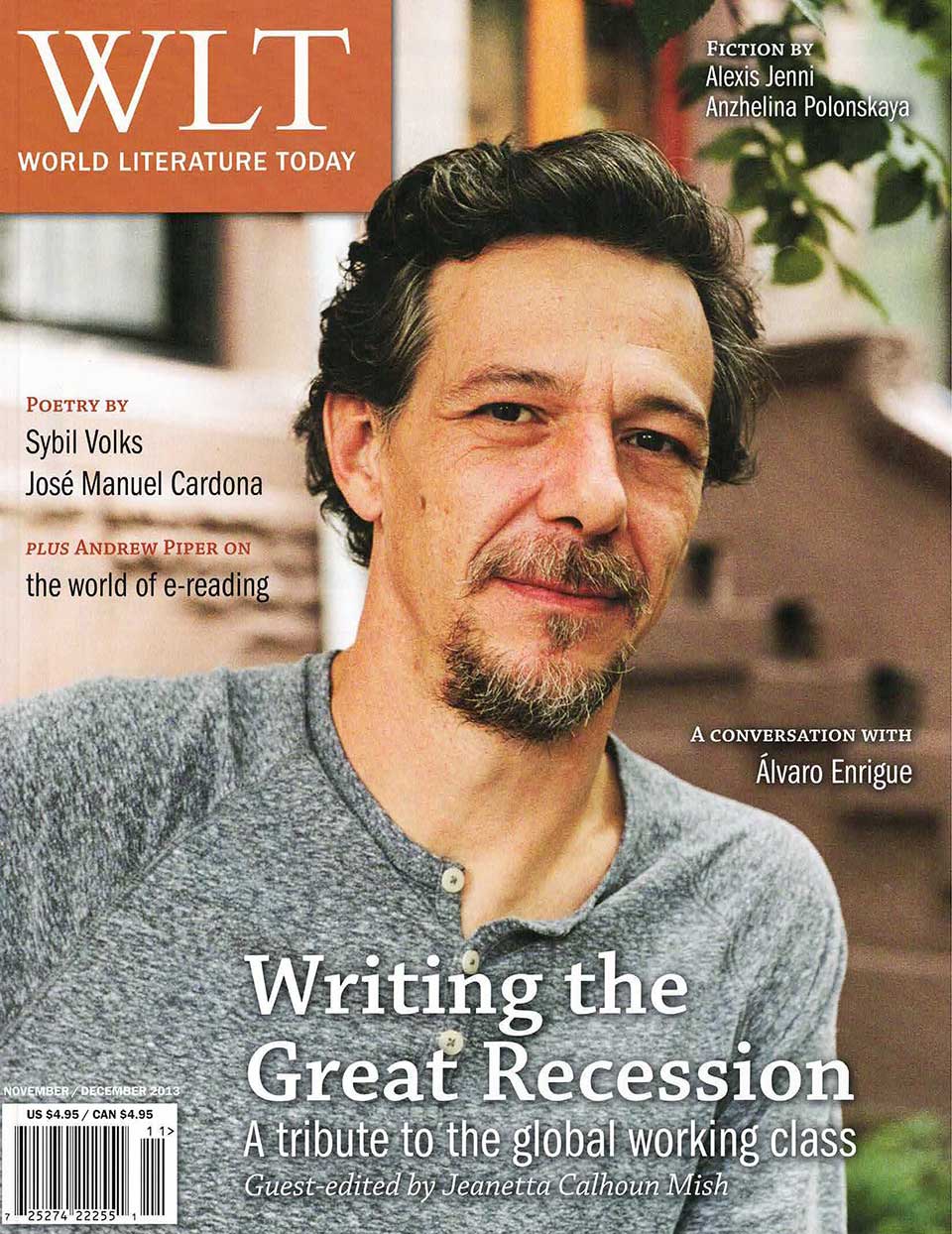Why Say Goodbye: Reterritorializing Working-class Literature in Contemporary Korea
Evening Time
Ha Jong-o
On the subway at evening rush hour
I called my wife to say I was on my way home.
Hearing a familiar voice, I looked round,
among the exhausted people on their way home,
and saw myself, with a small body, short legs and arms,
pushing the numbers on my phone
then talking to myself without
thinking of my fellow-commuters.
Judging by his clothes,
he was a day laborer;
judging by his face,
his ears were Mongolian
his eyes Vietnamese
his lips Thai
his nose Cambodian.
Having parted with myself somewhere
thousands of years ago, tens of thousands of years ago,
I have come back today and am calling to send myself a message,
complaining that the line is busy.
When the subway stops at a station
I disappear into the throng of people on the platform,
with my cellphone in the rear pocket of my pants.
Still talking to my wife on the phone,
I look at him blankly.
Translation from the Korean
By Eun-Gwi Chung
Editorial note: From A Factory with No Border (2007).
Let me start at the end. I want to begin by going back briefly to a day not too long ago when I was about to put a final period to the first draft of this essay. In the draft, I thought I had succinctly illuminated the overall history of working-class literature here in Korea, from its earlier burgeoning in the 1920s to its glory as the leading force for political transformation and democratization in the 1980s, to its decline and downfall in the 1990s and 2000s, and then onward to the exploration of new possibilities in the 2010s.
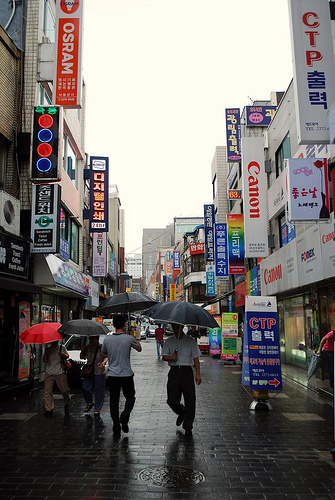
Reading the morning paper on that day, I stumbled across a piece entitled, “Now, Time for On-the-Spot Poetry, Instead of Working-class Poetry” with a mournful phrase, “Goodbye, Working-class Poetry.”[1] At first glance, the title itself seemed to tersely dismiss the presence of working-class literature. I was rather perplexed by the title. Does it declare once again the end of working-class literature? Or is it just a bit of click-bait to capture readers’ interest? Does it refer to the death of literature or the death of the working class? Even if we admit the bitter reality of the working class, once a representative name as the object of capital’s exploiting power and the main body of resistance against the dominant system of capitalism, or even if we just repeat the hackneyed phrase that “work is a blessing” in this neoliberalist system, the era of rampant unemployment, it’s not time to say goodbye, to write an obituary for both the working class and its literature.
In Korea, discourse on working-class literature is traced back to Im Hwa, the central figure of KAPF (Korea Artista Proleta Federatio) in the 1920s. His poem “Suni at the Crossroads” summons Suni, a common name for a girl at that time, as the most lovable worker, the sister of all workers. Through Suni wandering the streets of Jongno, Seoul, the poet gropes for solidarity between the working class and the awakened intelligentsia. Working-class literature, passing through the turmoil of modern Korean history, such as the Korean War and the April 19 student revolution in 1960, was developed in its specific form as “literature of engagement.” The 1970s and 1980s witnessed its remarkable growth; the working class proceeded to be the center of political, social, and aesthetic transformations in the yearning for political democracy. In the turmoil of modernization—a national pursuit of economic growth as the overriding priority, without regard to equality—the working class was in various ways a problematic notion for Korean society, with its power and sacrifice, its desire for wealth, stability, and equality. The solidarity of workers in the process of modernization and democratization attained its driving force, and working-class literature, featuring the distinctive mode of social realism, became a special form of Korean minjung (populist) literature. The literature took an active role in advancing the political democracy of Korea and in overthrowing the military dictatorship in 1987.
With the 1997 IMF bailout and the expansion of global capitalism (the 1990s and 2000s), the neoliberalist era saw the drastic decline of the working class and its literature. Literature seemed to voice its presence only as a remnant and reminiscence, buried in the private inner thoughts of everyday life. Titles such as “Is Working-class Literature Dead?” and “Present or Absent: Working-class Literature” captured the social and political crisis of the working class and reflected the decline of its literature. Meanwhile, the working condition of workers has worsened: workers have become stratified, fragmented, marginalized, and dissipated, with many sectors of work completely erased. Sharp divisions between fixed-term employment and temporary employment became a pivotal issue. Today the working class does not appear as a unified force in this multilayered society; it is profoundly divided, its vanguard dispersed, and its striking force blunted. In 2013, 45.9 percent of salary workers in Korea are temporary workers, their salary is 49.5 percent of fixed-term workers, and the minimum hourly wage for temporary workers is 4,850 won, or around $4.20, less than the price of a hamburger. With the fragmentation of the working class itself, working-class literature seems to retreat to the back alley of history.
But why say goodbye to working-class literature? Where have all the writings gone? Despite the dire diagnoses for working-class literature over the past twenty years, many of the contemporary novels and poems that gripped me in the last ten years have vigorously explored working-class life, its destruction and possibilities. If writing is “a paradoxical form of expression that undermines the legitimate order of discourse,” I find, in those contemporary Korean novels and poems, an alternate mode of working-class literature that is compelled by the greater force of “dissensus” creating “a fissure in the sensible.”[2] And so I repeat, with the same persistence with which critics have buried first the one and then the other, that the burial of either one, literature or the working class, is premature. Rather than nostalgia for the glory of the past, we need to read the vitality of the present, understand the new, dispersed, pluralistic forms of its experience, and gauge the growth of alternative writings and readings of working-class literature. What needs to be explored here and now is not whether working-class literature still exists but what new forms of working-class literature are possible under the conditions of a working class that has been divided, disoriented, stratified, and scattered. If the morning paper is correct and working-class poetry needs to be deconstructed, the purpose of this deconstruction should be to salvage the building materials; we shall surely need them for reconstructing and resituating it.[3]
Critics agree that the subjectivity of working-class literature has been modified in a subtle, complicated way so that the subject of writing does not seem to be a deciding factor of working-class literature anymore, as it was in the past. Many writings by nonfactory workers have already been counted as meaningful achievements of working-class literature, pushing the contradictory forces of reality. Poems by Park Nohae and Baek Moosan, both of whom were in the apex of the 1980s working-class literature “of workers,” have been transformed from representing the collective voice of workers into releasing rather mystified, prophetic proclamations (Park) or catching the volatile moments of ordinary consciousness embedded in the nature of working itself (Baek).
The current topography of working-class literature obviously lies beyond the frame of a nation or a people of the past. In “In the Name of Life,” Baek proposes, “Someone tries to trap me in a people / Someone tries to trap me in a nation / Someone also tries to trap me in an empire . . . Don’t say that I am someone’s territory / Don’t say that I am someone’s exclusive territory.” For Baek, working is neither the object of sublime aesthetics nor the power to change things outside of the subject; a conventional pavilion of working, “someone’s exclusive territory” is denied and dismantled. Working becomes the form of life invoking vital contemporary values and ideas. Destabilizing the established order of working and the fixed location of a subject, the poet clarifies the transformed achievement of working-class literature rather than distorts it.
Ironically, the new wave of working-class literature began with the radical retreat of democracy and the devastating success of capital and profits in the second decade of twenty-first century Korea. More and more people buried their hope and desire in the skyrocketing apartment prices, and more and more people were chased to the periphery of the city, losing their jobs. The familiar center of the metropolis Seoul became the periphery in the name of a slum, an othered space that should be demolished and rebuilt. Hwang Jeong-eun’s novel One Hundred Shadows (2010), a truly outstanding example of working-class literature, revisits the othered space. Her wretched characters are endlessly chased to the periphery of the city. Under the rosy slogan of “Designing a Stylish City Seoul,” the winds of redevelopment tear through the city and their living space is jeopardized without end, perhaps until they become shadows.
For Hwang, inscribing the marginalized is done more effectively in an experimental language of colloquialisms, fractured words, jests, jokes, puns, and repetition. “It’s an area to be leveled at some point, and if you think of it in terms of someone’s livelihood or living space, things get too complicated. That’s why they simply label the area ‘slum.’ It might be, saying slum. Slum, slum, slum, slum . . . How strange is it? It sounds strange and a little bit scary.”[4] The writer asks who has the right to violently label (and then level) a space where someone eats, sleeps, and raises children with the term “slum.” Hwang’s minimal style and magical realism, combined with a distinctive mingling of fantasy and reality, follows the achievement of Cho Se-hui’s The Dwarf (1978). Vividly portraying the horror of the wretched who can’t have a legal living space in the metropolis, Hwang reframes workers as more urgently endangered and interspersed species in society and at the same time explores the possibility of building their community of feeling, in terms of love, which seems to be very feeble but the only weapon to fight against the gigantic system of capital.
As the territory of the working class moves to a more volatile mass including tenants, vagabonds, part-time instructors, temporary workers, immigrants, beings with no share on the edge of society and law, even the dead on the merciless edge, writers began to capture the volatile face of the worker. The poem published here, “Evening Time,” by Ha Jong-o, is an example.
In this poem, depicting a very ordinary rush hour in a subway, Ha focuses on a sudden recognition of a laborer; he becomes everybody; he faces the mixture of all foreigners in his own face. In the moment of epiphany, he realizes that he is the hybrid of all laborers from other countries. His body is abruptly deterritorialized at once and then reterritorialized again. The process is sudden and horrible rather than welcoming. But here in this double movement, the subject dismantles the solid line between himself and foreign laborers. Though the man, another I, disappears in the crowd like an apparition, in the short experience of being amalgamated, we readers experience a moment of recognition, of solidarity—unstable but still quite meaningful.
Working-class literature in contemporary Korea is obviously taking its form and energy from a much more jeopardized working condition. In an experimental poem full of repetition and wordplay (an effective device to convey the critical atmosphere floating all around Korean society), “A Ghost 3” (Painful Paradise, 2010), the poet Lee Youngkwang revisits the endangered, leveled urban spot where the dead are still lingering under suppression and assault: “By design / by improvisation / by law / people are dying.” Yet the poet does not succumb to the overwhelming image of death and failure. He goes on voicing the desperate, tenacious fights that gradually become collective: “Ah, desperately, / totally, / the dead is not dying. // The dead is still missing. / is still on strike / is still throwing himself.” At the end of the poem, the poet is still gazing at the morning paper that “seems to be an obituary” where ghosts are floating, as I did by myself which confirmed the urgent need to recall working-class literature.
Saying goodbye to working-class literature and changing its name to match the ever-flowing front lines might be a way to break through this deadlock. But still I hesitate to replace working-class literature with others, like the morning paper’s “on-the-spot literature.” Workers, in this neoliberal era, are not the remnants or traces of modernity. They are not “non-class,” as some critics say. Workers are every name that can be mutated into all living beings—those working, fighting for work, fighting for equality, wandering and not working, sitting alone on the spire and striking for basic human rights. And so writings of the working class, not simply “a sequence of typographic signs” but “a specific distribution of the sensible” undermining the “legitimate order of discourse,” if I may again borrow from Rancière, might be reborn in the calling of urgent words of/for working class, for all beings on the edge, living and loving without receiving their just rights and roles. That’s why we need to listen more patiently to, wait for, invite, or dig out the not-yet-arrived words as the form of relocating working lives, of fighting against forgetting the dead. Whether the words are from the very spot or field where something happens or not, in that waiting, in that invitation, in that expansion, working-class literature will be “relived in fires of life, scorched by the fires.”[5]
Seoul, South Korea
[1] Choi Jae-bong, in a piece titled “Now, Time for On-the-Spot Poetry, Instead of Working- class Poetry” in The Hankyoreh, July 9, 2013, introduces the special section of Poets Village, a Korean poetry journal, with its introductory essay, “Goodbye, Working-class Poetry.” Here, the spot (in Korean, Hyunjang 현장 現場) means the very place where an accident or event happens; thus, “On-the-Spot Poetry” reflects a special phenomenon of contemporary Korea in which poets and writers rush to the very spot/field/scene, voicing and fighting for people on the edge.
[2] Jacques Rancière, The Politics of Aesthetics (Continuum, 2004), 92, 85.
[3] According to Koh Bong-jun, in the notion of working-class poetry, the special meaning of the “factory” working in the past (Fordism and industrial capitalism) is embedded. That’s why he says good-bye to working-class poetry. “Good-bye, Working Class Poetry,” Poets Village (Summer 2013), 164–65.
[4] Hwang Jeong-eun, One Hundred Shadows (Mineumsa, 2010), 115.
[5] In his recent book, Scorched Art (Mineumsa, 2013), Shim Bosun, a sociologist and poet, declares, “Art is Dead. Art will be relived in fires of life, scorched by the fires.” Emphasis is mine.
